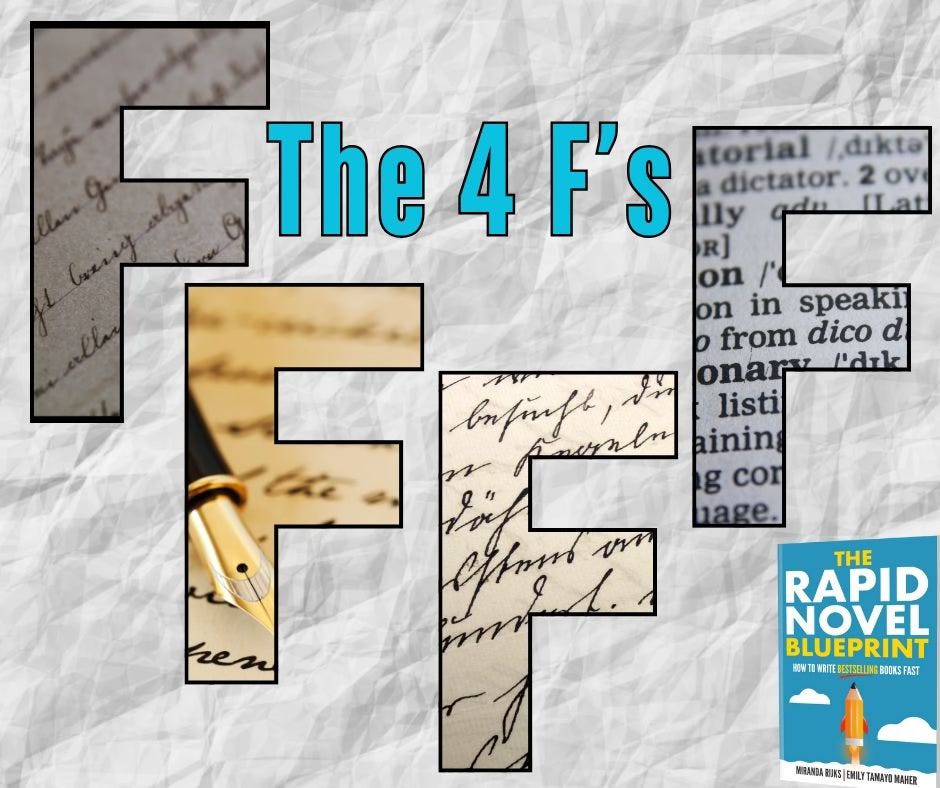I cannot take credit for this idea. The concept of the 4 F’s is Emily Tamayo Maher’s (the best book coach in the world - in my opinion!). When she explained it to me, it was as if a light bulb flashed inside my head. We talk about the 4 F’s in our book, The Rapid Novel Blueprint, and I think they’re so important, I wanted to share them here.
When we dream of becoming an author, we tend to have various aspirations. It might simply be to see our name on the front of a book, or it might be that we hate our day jobs and hope that writing can become our main source of income. Perhaps we’re unhappy in our lives and hope that writing will give us that elusive sense of freedom. Or maybe we want to be famous and think that writing is the ‘easiest’ route to achieve that.
I think back to the many years when I dreamed of being a full-time fiction writer. At no point did I ask myself why. With hindsight, I was lost. I spent years trying all sorts of different careers, setting up businesses, gaining qualifications left right and centre, trying to prove myself. To whom, I’m not sure. (That’s probably for another introspective article!) Fast forward a decade, and I recognise I was seeking fulfilment and needed an identity. I remember struggling when people asked me what I did. Sometimes I was a business coach, or a consultant helping newbies set up fledgling businesses. But what I craved was a one-word description. Author.
The process of getting there meant I had to banish the biggest thing that was holding me back: FEAR.
Fear of rejection.
Fear of failure.
The very nature of most creative pursuits – whether that’s writing, art, music or acting, necessitates allowing ourselves to be vulnerable. It’s not just your body of work that you’re putting out there, but a piece of yourself. And that’s scary. In the last paragraph below, I’ve added an extra F, but for now, onto Emily’s Four F’s.
FANS will find you when you know your niche. The most successful writers become well-known in their specific genres; they don’t need to be household names. They need to read and love the types of books they want to write. Personally, I read at least six psychological thrillers each month. And no, I’m not worried about stealing other people’s ideas. Instead, I note what works and what doesn’t work (in my opinion). Regarding fans, I very much doubt that any romance reader will have heard of me. Hopefully, die-hard psychological thriller readers will have, and perhaps they’ve read a few of my books. They are my readers and for me, they are the only people who matter. (Sorry everyone else! 😂)
FORTUNE is all about understanding the business of books. Let’s be frank. It’s very unlikely you’ll be satisfied if the only people who read your book are your mum and your partner. We all want to write books that sell, but in order to do that we have to understand how to write books that appeal to your specific audience - i.e your genre. That doesn’t just mean understanding the key plot points, developing compelling hooks and writing well, it also means understanding publishing business models; choosing those that are right for you.
FREEDOM comes with confidence. Once you’ve written your first book and it has gained some traction in the world, you’ll soon decide if you want to continue writing, or if after completing that one book, you have fulfilled your writing dream. With freedom, you’ll work out how to navigate the publishing industry, you’ll know what processes resonate with you and you’ll work in a way that feels true to you. Writing success can mean freedom in other ways: freedom to leave a job that you don’t enjoy; having more money as a result of your writing; being able to travel or live the life you’ve always dreamed of.
FULFILMENT combines everything. As Emily says, it’s an intoxicating mixture of progress and purpose. There is nothing more rewarding than seeing your dreams come to life. I think this was what was missing in my life before writing. Now I feel completely fulfilled. I’ve written lots of books (25 psychological thrillers), I understand how to do it and what works and doesn’t work for me, and when someone asks me what I do, I can say I’m a full-time author. That’s the ultimate in fulfilment.
And before I sign off, I want to add one more F … but I’d strike it through. Fear. Fear. You need to be fearless to become an author. Yes, your work might be rejected multiple times, but you’ll learn from that process. The more fearless you are, the greater the chance you’ll have of success. One of the best ways to combat fear is to find writing buddies. Writing doesn’t need to be a lonely process – you can join writer’s groups, Facebook groups or enlist the help of a book coach.
Do let me know what you think of all these F’s! Do you agree?
ps - you can find Emily at https://www.meaningmethod.com
pps - Our book, The Rapid Novel Blueprint includes loads of FREE bonus resources. It’s just 99 c / 99 p on Amazon or free in Kindle Unlimited.





